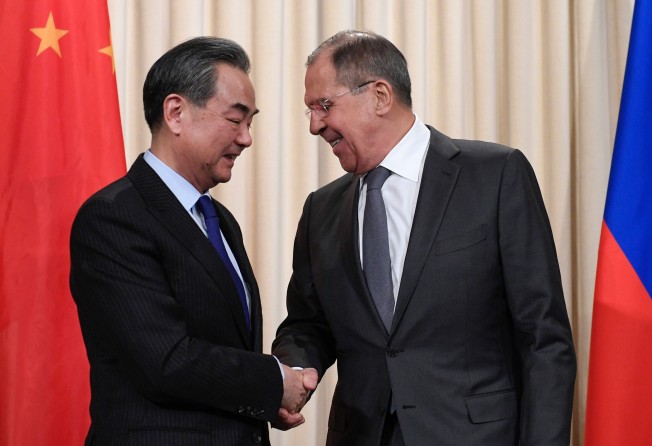China, Russia to stand ‘back to back’ as tensions with US rise, observers say
- Neighbours will look to cement ties so they can ‘jointly respond to the shift in US policy towards’ them, academic says
- Foreign ministers Wang Yi and Sergey Lavrov will ‘share opinions on international and regional issues of common concern’ when they meet in Beijing on Monday, Chinese foreign ministry spokesman says

China and Russia will look to nurture a “back to back” and “shoulder to shoulder” relationship when their foreign ministers meet next week against a backdrop of rising mutual tensions with the United States, observers say.
Zhu Feng, an international relations professor at Nanjing University, said that as China’s relationship with the US had soured – as had Russia’s – Beijing would seek to reinforce its ties with its giant neighbour to the north.
“Of course China will look to strengthen strategic cooperation with Russia, [so they can] jointly respond to the shift in US policy towards the two countries,” he said.
In an interview with ABC News on Wednesday, Biden described Russian President Vladimir Putin as a “killer” who would “pay a price” for his alleged meddling in the 2020 US presidential election.
Russia responded by summoning its ambassador to the US, Anatoly Antonov, home to Moscow for “consultations” on what should be done with regards to Moscow’s relations with Washington.
“In the context of the Biden administration’s strategic pressure on Russia being far stronger than it was under the Trump administration, improving China-Russia relations is one of the few strategic choices for the Kremlin,” Zhu said.
Beijing and Moscow would seek to enhance their “strategic coordination on international affairs”, China’s foreign ministry said on Wednesday, ahead of a meeting between Russia’s Foreign Minister Sergey Lavrov and his Chinese counterpart, Wang Yi – who is currently in Alaska for high-level talks with US diplomats – on Monday in the Chinese capital.
The two men would “compare notes on the bilateral relationship and recent high-level exchanges, and share opinions on international and regional issues of common concern”, foreign ministry spokesman Zhao Lijian told a press conference.
Yang Chuang, a retired international relations professor at China Foreign Affairs University in Beijing, said the two nations were facing a “common international environment, in which both have been labelled as strategic competitors by the US”.
Lavrov’s visit would therefore be a “good way for the two sides to reinforce their strategic coordination on international issues, discuss Biden’s foreign policies and, more importantly, develop a back to back and shoulder to shoulder relationship, which is much stronger than just an alliance”, he said.
Yang Jin, an associate research fellow at the Chinese Academy of Social Sciences, agreed, saying it was “necessary and urgent for China and Russia to boost strategic communication”.
“The need for them to stand back to back on major issues is greater than ever,” he said.
Zhao said that this year was a milestone for China and Russia as it marked the 20th anniversary of the Treaty of Good-Neighbourliness and Friendly Cooperation.
“We believe this visit will further cement the sound momentum of China-Russia relations … and enhance the two countries’ strategic coordination in international affairs.”
Wang said in January that “in developing China-Russia strategic cooperation, we see no limit, no forbidden zone and no ceiling to how far this cooperation can go”.
He and China’s top diplomat Yang Jiechi arrived in Alaska on Thursday for talks with US Secretary of State Antony Blinken and US national security adviser Jake Sullivan – the first high-level meeting between the two countries since Joe Biden was inaugurated as US president in January.
The two-day meeting got off to a frosty start but there were indications the mood improved later as the talks continued behind closed doors